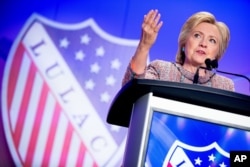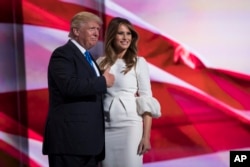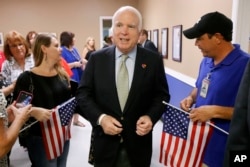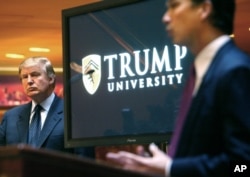Billionaire real estate titan Donald Trump's rise to the pinnacle of U.S. Republican politics — the party's 2016 presidential nomination — marks one of the most unusual paths to political prominence in American history.
Just 13 months ago, Trump descended from an escalator at Trump Tower in New York City, the luxury skyscraper he built and where he lives, to make the improbable declaration that he was running for president. U.S. political figures and media pundits greeted the announcement as something of a joke; analysts said there was only a minuscule chance that Trump would wind up as the Republicans' choice to succeed President Barack Obama.
But over the course of a contentious and often bitter year of campaigning, Trump triumphed over 16 other Republican candidates, almost all of them "professional" politicians — current or former senators or governors. Trump disparaged his opponents with belittling, schoolyard taunts and then handily beat them at the ballot box in state primaries and caucuses.
Millions of American Republicans were drawn to Trump's attention-getting and unconventional proposals — to ban all Muslims from entering the U.S., at least temporarily, to thwart terrorist attackers; to deport 11 million undocumented immigrants already living in the U.S.; and to build a wall along the U.S.-Mexico border to halt the stream of migrants.
Top target: Clinton
In addition to his broadsides against the other Republican presidential hopefuls, Trump railed against Washington "power brokers" — the political establishment — reserving his most stinging attacks for Obama, former Secretary of State Hillary Clinton and her husband, former President Bill Clinton.
The rookie politician declared repeatedly that his goal was to "make America great again." And by a wide margin, Republican Party members appeared to agree with the former television reality show host; they wore baseball hats and T-shirts and displayed lawn signs in front of their homes declaring that their goal, too, was to "make America great again."
Now, the brash Trump has become the first presidential nominee from a major U.S. political party in six decades with no experience in elective office at any level of government. He will face off against the Democratic Party's Hillary Clinton in the national election on November 8, and the winner will succeed Obama in January.
Clinton is trying to make history herself by becoming the first female U.S. president. National surveys show the Trump-Clinton race is close, although Clinton holds a narrow edge as she gets ready to formally accept the Democratic nomination next week at her party's national convention in Philadelphia, Pennsylvania.
Business background
Trump has spent a life building skyscrapers in New York and elsewhere. He has erected casinos along the Atlantic Ocean, bought an airline, and peddled steaks, wine and other products, all with his name branded on them.
He wrote a best-selling book about his real estate deals and hosted a reality television game show, "The Apprentice", that judged contestants' business skills. As the host, Trump famously told losers of the game: "You're fired!"
He has through the years gleefully bragged about his sexual exploits as a New York man about town, divorced two wives and married a third — a one-time supermodel — and he has fathered five children. He often skips away from New York to a palm-studded, 58-bedroom oceanfront mansion in Florida.
Before several recent presidential elections, Trump flirted with the idea of running for president, but political analysts — correctly until last year — predicted he would never actually enter the race and take on months of arduous campaigning and efforts to meet with individual voters.
But Trump is a relentless and skilled promoter of himself and his interests, and he entered politics a year ago on a rising wave of discontent among ordinary Americans — particularly those who are fearful of the spread of terror attacks by Islamist radicals, and those who feel left behind by cultural and economic changes in the country. Many workers with low-wage jobs, or those who have lost jobs in the past as a result of the increasing globalization of the U.S. economy, are in the "left behind" group.
Trump became their voice against the federal government, or at least against those parts of the government that many Americans who live outside Washington see as an establishment that hampers their freedom with excessive regulation, spends money too freely and harms their prosperity with trade agreements that favor other nations.
Elected Republicans uneasy
Despite those grass-roots feelings of admiration for Trump, most establishment Republican political figures kept their distance, or only reluctantly embraced his candidacy. Meanwhile, the other Republican candidates fell by the wayside as Trump moved forward with electoral victories.
Even now, the country's last two Republican presidents, George H.W. Bush and his son, George W. Bush, and the party's presidential nominees who competed unsuccessfully against Obama in 2008 and 2012, Arizona Senator John McCain and former Massachusetts Governor Mitt Romney, decided they had better things to do than attend the party's quadrennial convention in Cleveland, Ohio, and watch Trump claim the presidential nomination.
Of those four Republican elder statesmen, only McCain has endorsed Trump's candidacy, while Romney has openly denounced it.
Trump's political demise was predicted by many experienced political analysts at regular intervals during the past year, such as when the tycoon ridiculed McCain's political views and insulted his status as a war hero and a former prisoner of war in Vietnam in the 1960s.
The supposed experts shook their heads again when Trump coarsely disparaged a female broadcast journalist after she asked him at a debate to explain his long history of negative public comments about women.
Later, Trump mocked a news reporter he did not favor by delivering a graphic imitation of the man's physical impairments before a campaign rally audience.
In what was surely a first for a U.S. political debate, Trump boasted at one point about the size of his genitalia. He belittled his opponents with insulting nicknames. In another devastating attack, Trump described former Florida Governor Jeb Bush, the brother and son of the two Bush presidents, as having "low energy" and little appetite for the cut-and-thrust of politics. The description stuck and eventually ended Bush's campaign.
Criticism of judge
Trump denounced as unfair and biased against him a judge hearing a consumer fraud case against the mogul's role in promoting Trump University, a nonacademic enterprise that has drawn many complaints for the high prices and low value of its instruction about real estate investing, as well as for the high-pressure tactics its sales agents used to squeeze revenue from hopeful, low-income clients.
Trump vociferously criticized the judge, saying he should have removed himself from the lawsuit because his opinion was colored by his "Mexican heritage"; the jurist, who was born in Indiana, had no public response to the candidate's suggestion. Trump's comments only subsided in the face of a rising tide of anti-Trump reactions from respected Republican leaders.
The many brouhahas that swirled around Trump's vitriolic public comments did little to blunt his rising political fortune, however, and the 70-year-old self-professed billionaire moved ever closer to the Republican convention's finale Thursday night, when he will address the nation as the party's official presidential candidate.
Trump and Hillary Clinton have a history together: Trump and his current wife, Melania, invited Clinton and her husband to their 2005 wedding at Trump's Florida estate. A widely circulated photo shows the four of them smiling on the Trumps' happy day.
Now, one of them will become the country's 45th president.








